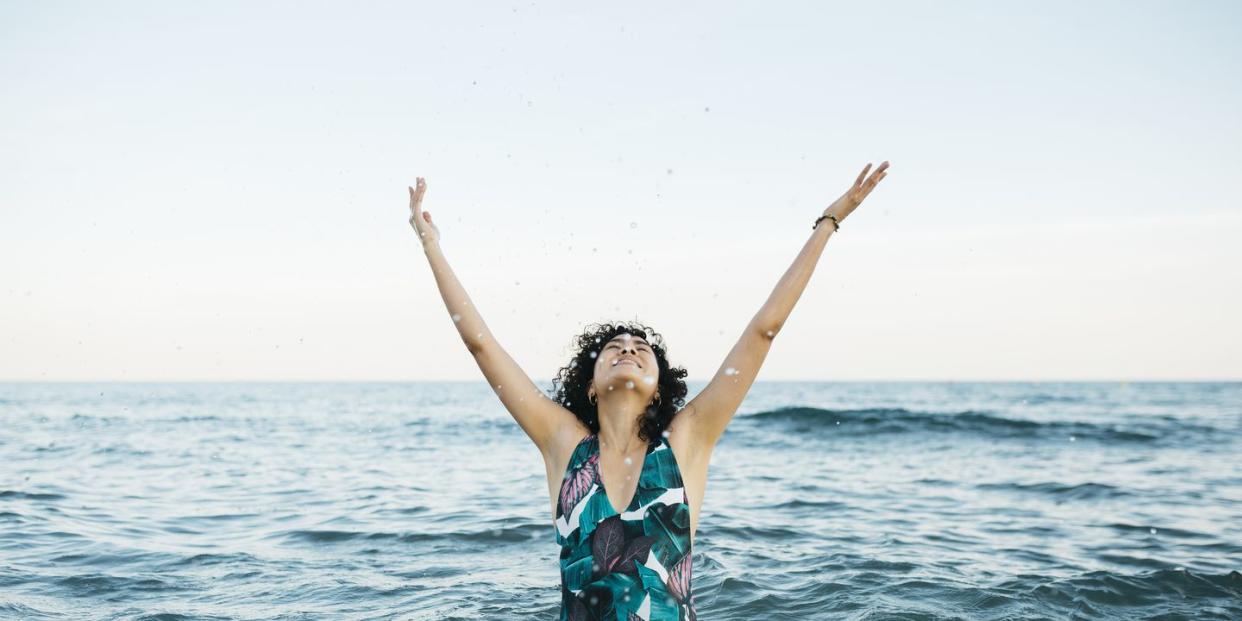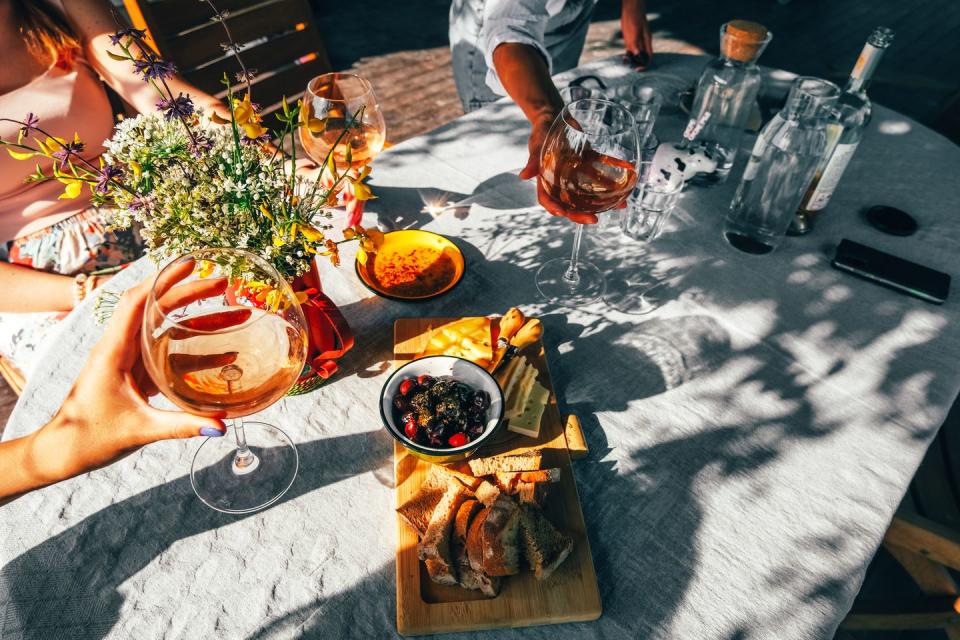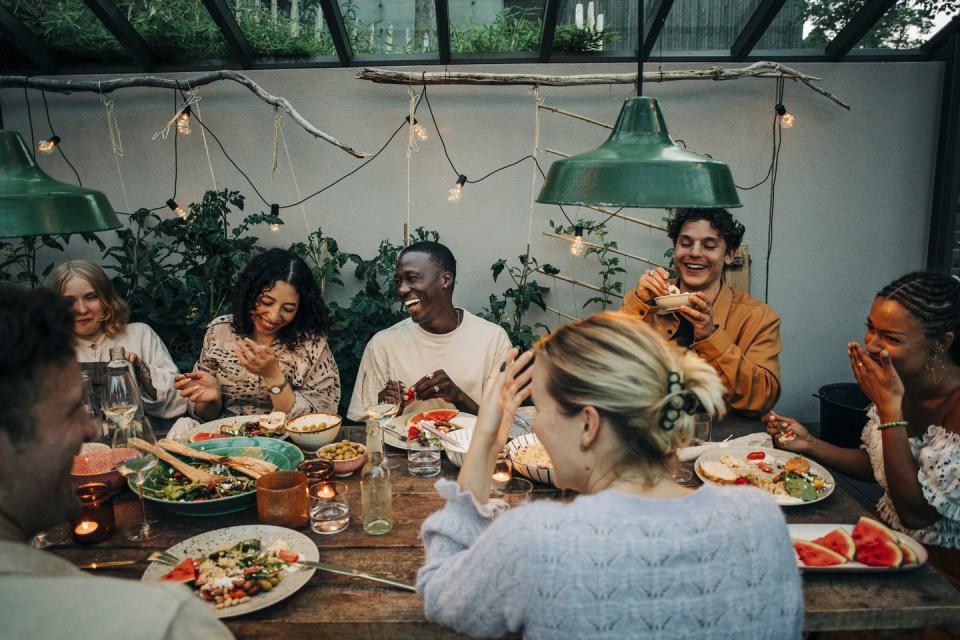The wellness space is hyped about 'blue zones' right now – but what actually are they?

"Travel around the world with author Dan Buettner to discover five unique communities where people live extraordinarily long and vibrant lives," IMDb encourages. Erm, sold.
Live to 100: Secrets of the Blue Zones is Netflix's newest travel/self-improvement series (call it what you will) that takes viewers to different corners of the globe in a bid to suss out the secrets behind the world's longest-living people, i.e. the exclusive centenarian(+) club (meaning those who live to 100 and beyond). Who, by the way, aren't chilling in armchairs waiting for 100th birthday cards from the King, but are still living active, dynamic, lust-for-lifey-ey lives.
How, you ask? Well, it's all to do with blue zones, of course.
What exactly are blue zones?
Researchers Michel Poulain and Giovanni Mario Pres first coined the term in 2000 after studying longevity in Sardinia - where in the island's Nuoro Province - they found the highest concentration of male centenarians anywhere.
Essentially, blue zones refer to longevity hotspots where people have claimed to/have consistently lived to 100+. (According to the Office of National Statistics, life expectancy at birth in the UK in 2018 to 2020 was 79 for males and 82 for females.) Plus, 'blue zoners' (as I'm now calling them) also have lower rates of chronic diseases, such as dementia, heart disease and cancer, studies show.
Following the revelation of Sardinia's exceptional population, Buettner later proposed four additional blue zone areas: Okinawa in Japan, Nicoya in Costa Rica, Ikaria in Greece, and the Adventist community in Loma Linda, California. All five of which are featured in the new Netflix miniseries.
"Despite the distance between them, they share similarities in their approach to wellbeing by putting emphasis on a whole food-based diet, daily exercise and community activities," says BANT registered nutritionist Eva Humphries. "These health-promoting activities and lifestyle variables (which we'll get to in a sec) offer many fantastic learning opportunities that may support our wellbeing irrespective of location."
So - aside from destinations (some remote, some not) that produce generations of healthy, long-living people - what makes blue zones so special? And, just because you might not have been born into one of these significant parts of the world, does that mean you can't expect to reach such a milestone age?
What makes blue zones so special?

Upon identifying the five blue zones we know today, Buettner and a team of other researchers found that each of the areas shared nine specific lifestyle habits that they dubbed as the 'Power 9.' These are as follows:
Move naturally
Blue zoners don't necessarily break a sweat in the gym or train for hours on end. Actually, it's the environments they come from that require them to be constantly moving and on the go. For example, the Netflix series revealed that people in Okinawa are always tending to their gardens, or that the Sardinians live in steep, small villages and are always walking (thanks to the lack of mechanical conveniences) on an incline. "They do seemingly move a lot more than us deskbound folk would," Eva admits.
Bottom line? Make time for a daily walk and always take the stairs.
Purpose
"The Okinawans call it 'Ikigai' and the Nicoyans call it 'plan de vida'," writes the official blue zone site, both of which translate to "why I wake up in the morning." It may sound simple, but - again, according to the research - having a sense of purpose can add up to "seven years of extra life expectancy."
Downshift
Sadly, there's no escaping stress, even in blue zones. But they just know how to manage it better. In a nutshell, the world's longest-living people have found daily routines that don't exert or enhance stress. They also make sure to take time for themselves if things get too much. For example, Sardinians do a happy hour, Ikarians take a nap (two things we can absolutely get on board with) and Okinawans remember their ancestors.
80% rule
The Okinawans follow a 2,500 year old mantra that reminds them to finish eating when they feel 80% full. Plus, people in blue zones eat their smallest meals either early evening or late afternoon. This 2022 Harvard study found that late-night eating and weight gain were linked, as it "affects how the body stores fat and regulates appetite hormones."
Plant slant
From watching the Netflix show, it's clear that all of the blue zones follow pretty much the same (or similar) diet, which is their own version of a typical Mediterranean one. (And which we all know is one of the healthiest diets going.) This basically means opting for little meat but more plant-based ingredients, like beans, greens, yams and sweet potatoes, fruits, nuts, and seeds.
"As a nutritionist, I can see why this may work so well," says Eva, explaining that vegetables contain a heap of health-promoting nutrients that many of us miss out on.
In terms of diet in general, she adds that whole foods contain more nutrients and fibre which studies indicate may be beneficial for health and longevity.

Wine
Did somebody say wine o' clock? If you were worried that following a blue zone lifestyle meant giving up life's little pleasures like wine (for some, not all), you'd be *widely* mistaken. Actually, people in all blue zones (bar Adventists), enjoy a tipple (one to two glasses to be specific) most days. But - they don't overdo it. Which means you can't save up those imaginary drinks tokens to go on a bender at the weekend, soz.
Belong
For the blue zone research, 263 centenarians were interviewed, and only five of them didn't belong to some sort of faith-based community. It showed that belonging to something bigger than you, and attending at least four faith-based services a month can add four to 14 years of extra life.
Loved ones first
Family-first is another of the most important social mantras in every blue zone. From caring for older relatives to being in positive, committed relationships, (and encouraging every age group to take part in family activities or help out), this power 9 can add up to six years of life.
Right tribe
"Perhaps one of the leading strengths of the blue zones is their ability to form community groups," Eva notes. "We know loneliness is associated with poor health outcomes so spending more time with others may be of greater benefit than we really give it credit."
FYI, the world's longest-living people are either born into healthy support circles (which, sadly cannot be the case everywhere), or choose to create their own. See: the Ikarians in Greece make time to frequently socialise with their community, while the Okinawans curated their own support-system, called 'Moai.' 'Moais' are a group of five friends that commit to each other for life - through thick and thin.
Basically, call up your mates and make time to hang out.

Is it possible to live a 'blue zone' life outside of blue zones?
While you can't strictly be classed as a 'blue zoner' if you hail from anywhere other than the five (current) environments, there are things you can do in your own life that mirror the healthy habits of the centenarians. Which, hopefully, will increase your chances of living a longer, more vibrant existence.
From staying active, connecting with friends and eating nutritious diets, (sorry, we can't all be from remote, paradise islands), perhaps the blue zones have just embraced what's been there all along: the simple things in life.
Live to 100: Secrets of the Blue Zones is available on Netflix now.
You Might Also Like


